Undergraduate students' reflections on engaging in a student-staff collaborative study
Christine Collinsa, Sophie Roachb, Poppie Ephgraveb, Yasmin Dawneyb and Claire Dickersonc
aSenior lecturer; bUndergraduate student, BA (Hons) Early Childhood Education programme; cResearch fellow School of Education, University of Hertfordshire, UK.
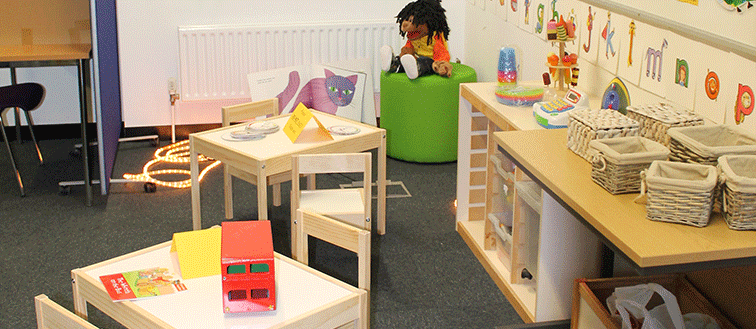
Abstract
This article provides insights into undergraduate students’ reflections on their learning from taking part in a student-staff collaborative study in their first year at a UK university. The study comprised a series of small-scale research and evaluation activities. In the individual narratives and jointly developed model presented in the article, the student authors identify a range of learning from their participation in this study and from co-authoring this article.
Introduction
This article explores undergraduate students’ reflections on their learning from taking part in a student-staff collaborative study in their first year on a BA (Hons) Early Childhood Education (BAECE) programme. The extracurricular study was carried out by a team of seven students and two members of staff from the School of Education, University of Hertfordshire. Five members of that team, three students (Sophie, Poppie and Yasmin), and the two members of staff, wrote this article during the students’ second year at University. As authors, we met four times at the beginning of our reflective writing process and used a summary report of the study as our starting point. During the writing process the student authors documented their learning from engaging in the study in three ways: they each annotated a copy of the summary report with comments (‘student notes’); they wrote personal reflections; and they worked together to create a model to share their learning.
We start our article by describing the BAECE programme and explaining how we carried out the study during the first year of the programme. We then present and discuss each of the three student authors’ personal reflections on the study and their jointly developed model. We conclude with some implications for practice. This article provides insights into engaging early years undergraduate students in small-scale research and enquiry and their development as reflective learners.
The BAECE programme
The University of Hertfordshire BAECE programme focuses on the education, development and care of young children and is designed for students who wish to work as graduate practitioners in the early childhood sector. The programme content is informed by international research and practice. Internationally, the part that early years or early childhood education and care practitioners play in supporting the development of young children is increasingly acknowledged and valued (Campbell-Barr et al., 2015). Their importance has been emphasised by studies such as the Effective Provision of Pre-School Education (EPPE) study (Sylva et al., 2004), which showed that improving the quality of children’s experience in early childhood settings relates to better outcomes for their learning and development. Staff qualifications and training contribute to the quality of this experience (Sylva et al., 2004).
In 2015, one of the authors, Christine, the lead for the student-staff collaborative study, included the ‘reflective activism’ model of reflection (Hanson, 2012: 144) in the BAECE programme to support student learning and encourage a deep understanding of reflection. Critical reflection is considered important for adult learning (e.g. Schön, 1982; Mezirow, 1990; Brookfield, 2017) and students on the BAECE programme are encouraged to reflect on their learning. Reflection is seen as essential for connecting theory and practice (Korthagen et al., 2006). In this programme it supports students’ development as the emphasis changes from personal and professional development and theory (Year 1) to linking theory to practice through work-related and workplace learning (Year 2). Students usually start to engage with research after the first year and complete their own research project in Year 3. Healey and Jenkins (2009: 3) emphasise the importance of this engagement asserting that ‘all undergraduate students in all higher education institutions should experience learning through, and about, research and inquiry’.
The BAECE study
This study was conducted in Year 1 (Level 4) of the BAECE programme by: a senior lecturer on the programme (the study lead); a research fellow; and seven student volunteers from the first cohort of the programme. The study was framed by research suggesting staff-student collaborative enquiry in higher education can improve student engagement and understanding of the research process (e.g. Dickerson et al., 2016). The approach to working together was defined by staff-student partnership principles: ‘shared responsibility’ and ‘co-agency’ (Dickerson et al., 2016: 258-9); and respect and care for individuals. The study was informed by a constructivism paradigm (Guba and Lincoln, 1994) and qualitative methodology and was carried out in adherence to University Ethics Committee requirements. All students within the cohort were invited to take part; they were free not to participate or to withdraw without explanation. Students’ data were anonymised prior to analysis by members of the study team.
Aims
The overall aims of the study carried out in Year 1 of the programme were:
- To obtain insight into student learning experiences on a new BAECE programme;
- To develop a collaborative enquiry between students and staff early on in their programme in order to promote positive student engagement with their programme and a deeper understanding of research processes; and
- To facilitate students’ reflection on themselves and how they learn in order to enhance their ability to understand the importance of research–informed practice and the benefits of this to children and families.
The aims of the research project nested within the study were: to explore aspects of student learning on the programme, and in particular to explore students’ perceptions of whether they had used reflection to support their learning, and if so, how.
Study design
The study team met four times in Year 1. The study comprised three sequential small-scale research and evaluation activities (Figure 1): i) a research project; ii) an evaluation of the first three modules of the programme; and iii) an evaluation of this study. The seven student members of the study team contributed qualitative data and the research fellow documented aspects of the study process and discussions.
Figure 1 - Overview of the study design
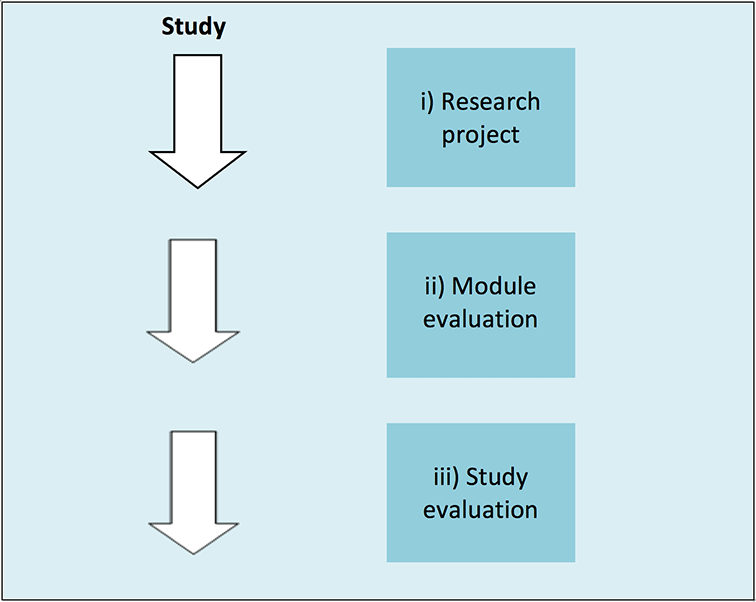
Data for the research project (Figure 1) were collected during a ‘post-it note activity’ and through using an emailed self-completion questionnaire to gain insight into the students’ perceptions of learning and reflection and to support their reflection on themselves and how they learn. Study team members worked together to analyse, discuss and reflect on the research findings.
Learning and reflection post-it note activity: an example of data collection and management
During the first study meeting each student wrote their responses to the following two questions on post-it notes:
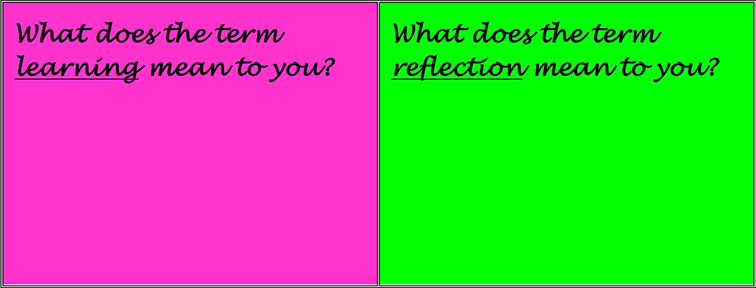
Before analysing the transcribed data from the post-it notes, team members completed an activity that involved sorting pens and pencils to illustrate that data can be analysed in different ways. Then, working in groups of two or three, the students within the study team content analysed the data, a ‘qualitative data reduction and sense-making effort that takes a volume of qualitative material and attempts to identify core consistencies and meanings’ (Patton, 2002: 453, original in bold). Using different coloured pens they recorded the name of each category they identified in a unique colour (Figure 2) and then used the same colour to underscore the relevant data. Following this ‘colour coding activity’ the students discussed the different ways they had found of categorising the data and talked about issues such as making assumptions.
Figure 2 - Categories identified by one group of students
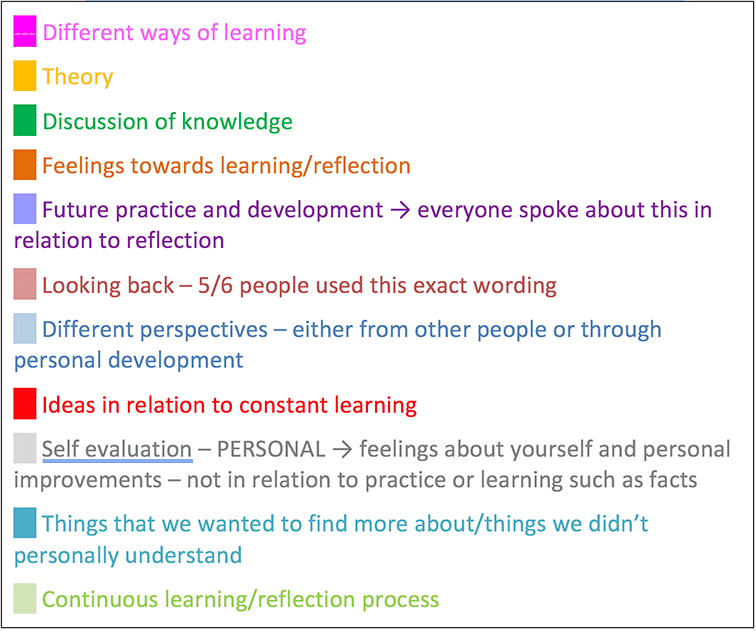
Dissemination activities
At the end of Year 1 the students presented posters showing how they had conducted the study (the process) at two School of Education events. These posters were displayed at a BAECE programme Open Forum, attended by their peers and staff members (Figure 3); and an Open Space seminar attended by academic staff (Figure 4).
Figure 3 - Poster for Open Forum
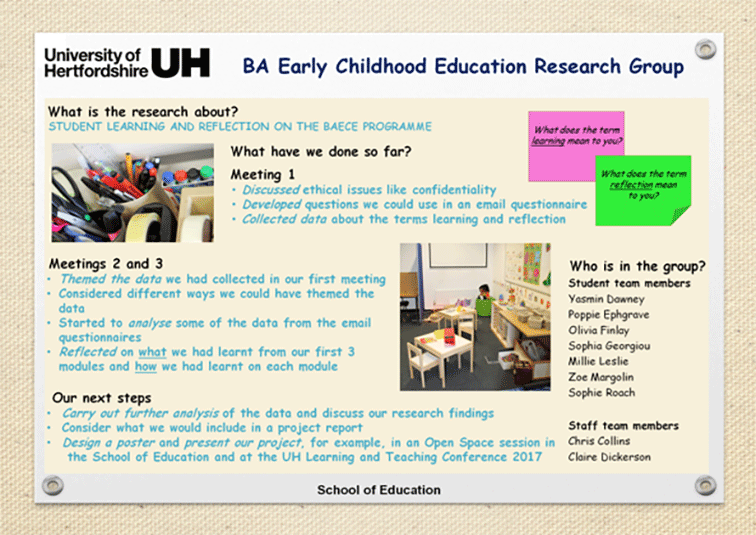
Figure 4 - Poster for Open Space seminar
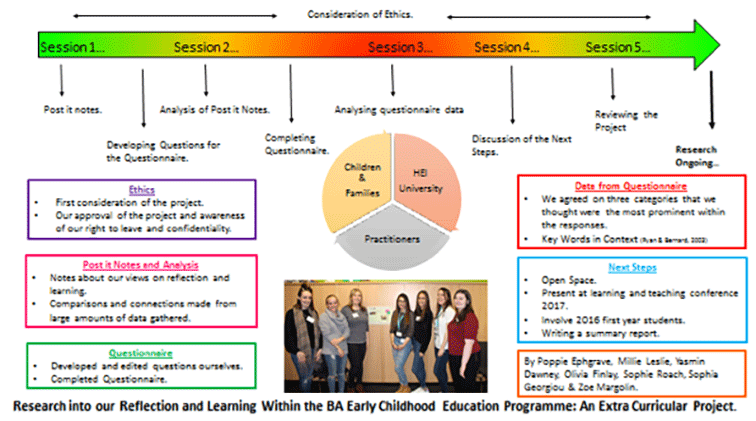
Students' individual reflections and shared model
In this section the three student authors, Yasmin, Sophie and Poppie, present their personal reflections on the study and share the model of outcomes from the study. The students wrote their reflections and developed the model as part of the process of writing this article in Year 2 of the BAECE programme. The model shows reflection in an overarching position, illustrating its importance to them, and their areas of learning classified using three themes: ‘research process’; ‘collaboration’; and ‘what we have valued’ (Figure 5).The students’ decision to develop the model and the creative process itself provided opportunities for reflection, collaboration and dialogue.
Yasmin’s reflections:
One of our first activities was to write on post-it notes ‘what does learning and reflection mean to you?’ To begin with I found this difficult to do as I had never sat and thought about it before, they were just two processes that I do. Following on from this we did an analysis of the data from the post-it notes. I found this activity particularly helpful as one of our modules (child study) asked us to analyse data. So, I used the colour coding activity to help me do this.
Within the study, I had a dual role of being participant and researcher. I think this has probably had positive and negative impacts on the research. A positive impact on the research could be we were talking about our own experience which made it personal and easy to relate to. A negative impact could be we may have felt we needed to answer questions in a certain way to get the results we wanted. It has also shown me how research feels from a participant’s perspective. So, when asking the parents of my child study to take part, I have made sure they felt no pressure and explained that they could pull out at any time.
From doing this study I have learnt how effective group working is with your peers as it challenges your own thinking and provides you with different perspectives. This can be seen throughout the study as we all went through the same learning experience but we all have differing views and opinions on it. After taking part in the Open Space seminar my confidence has grown as I was able to present to a room of lecturers and answer any questions they had. I feel this study has provided me with a good underpinning knowledge of what research is, and the processes involved, which I can use in my future studies and practice.
Sophie’s reflections:
I have found this research project to be truly eye-opening. From our role as researcher and researchee we have been made aware of ethical issues and the full process of the project, which I believe is a valuable and interesting way to start my first experience within research. Research runs throughout the course programme, especially being seen in years two and three…
The data we have collected is quite fascinating considering we are on the same course and similar age. It just goes to show how our personal experiences and backgrounds have shaped how we feel and think. I would have thought there would be some clashes in ideas and thoughts but I think we have collaborated as a full research team, with the process allowing us to do this.
The moment that stood out for me was the Open Space session where I felt proud to share our team’s work and what we have found and learnt.
Poppie’s reflections:
Initially I took part in the study due to my curiosity about the research process and I was highly intrigued by the thought of participating in a group project within the University. I felt from the outset that this would be a good experience for me and help me to expand my skills within research and working in a collaborative team. I am pleased to say that it has helped me greatly in both areas.
One of the most interesting factors for me within the study was the idea of reflection and the amount of insight it gave me when reflecting as part of a team. I have learned so much from the other students and the members of staff as well as really enjoying listening to what they have gained from both the course and the research project. I have found this particularly fascinating due to all of us having either some very similar ideas or completely opposing insights into what we have experienced. I think this is the reason why I have learnt so much from the research project. It has made me realise the value of working as part of a team and how much other people’s views can help my learning to progress further…
Looking at the research process and areas such as ethical considerations helped me extensively with my two research based modules in year two. When I joined the research project I had no experience of research so this experience gave me a good and solid foundation to start with. It taught me a lot in terms of the ethics process, which helped me to value all of the ethical considerations I had to manage on the degree programme.
The sharing of our research within the Open Space and through the writing of the journal article has given me a real sense of achievement. Especially through the creation of the model! We have all come together and produced something that I hope will inspire other students to take part in research and learn more about the process to aid their studies like it has me.
Figure 5 – Students’ model: reflection on learning from the study
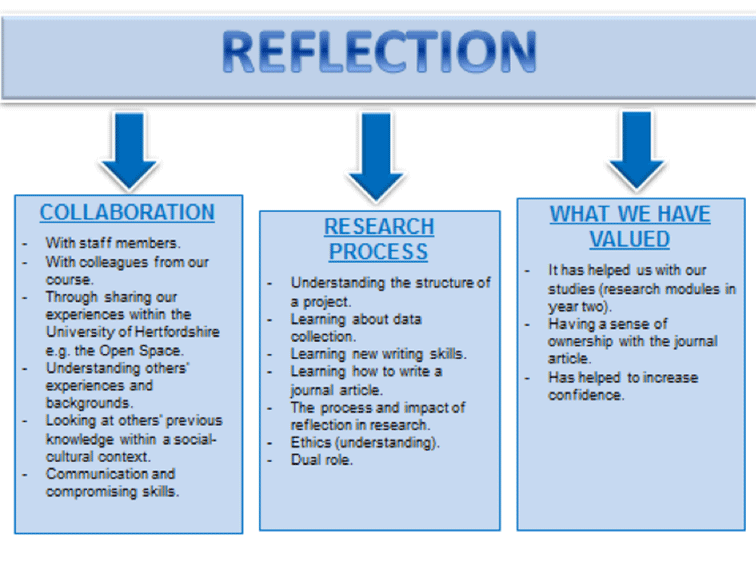
Discussion
In this section and the implications for practice, Christine and Claire explore and discuss some of the ideas Yasmin, Sophie and Poppie address in their reflections and in the model. The discussion is structured according to the model themes: ‘research process’; ‘collaboration’; and ‘what we have valued’ (Figure 5).
Research process
All three students mention ethical issues in their personal reflections and Sophie and Yasmin refer to their dual role as researcher and research participant. Yasmin links these aspects; being a participant increased her awareness of ethical issues such as voluntary participation and freedom to withdraw, which are addressed in institutional ethical approval procedures. The staff team members, however, encountered nuanced ‘ethical dilemmas’ (Shi, 2006: 217), which can present a challenge for this way of working; for example, the students’ dual role involved analysing data provided by themselves and their peers. Bovill et al. (2016) emphasise the importance of working ethically in staff-student partnerships designed to develop learning and teaching. In the current study ethical aspects of the research were frequently discussed and staff sought to model what they considered an ‘ethical stance’ (Denzin and Lincoln, 2011: x) throughout. This comprised heightened awareness of ethical aspects of researching together as staff and students and revealing some normally tacit aspects of ethical research.
Collaboration
Poppie, Sophie and Yasmin each reflected on one or more of the four elements of collaboration in Fullan’s definition: ‘work in teams, learn from and contribute to the learning of others, social networking skills, empathy in working with diverse others’ (2013: 9). For example:
- ‘the value of working as part of a team’ (Poppie)
- ‘I have learnt how effective group working is with your peers as it challenges your own thinking and provides you with different perspectives’ (Yasmin)
- ‘We have all come together and produced something’ (Poppie)
- ‘I would have thought there would be some clashes in ideas and thoughts but I think we have collaborated as a full research team’ (Sophie)
These extracts suggest that the students had not only engaged in a ‘process’ of collaboration that had supported ‘deeper thinking about practice in an atmosphere of supportive and constructive but honest feedback’ (Parsons and Stephenson, 2005: 95) but had also gained ‘collaborative skills’ (Wells and Cagle, 2009: 509).
What we have valued
Bleach (2014) reported that early childhood care and education practitioners developed confidence to work with others professionally through taking part in a professional development programme involving reflective practice and action research. Here, Yasmin, Poppie and Sophie identified an increase in confidence as a valued outcome of the study (Figure 5). They also valued ‘Having a sense of ownership with the journal article’ (Figure 5). Preparing this article has provided an opportunity for collaborative writing, in which each author has made a unique contribution. Harrington et al. (2011) draw attention to the social nature of writing activity, used at the beginning of our co-authoring process, but they note that collaborative opportunities are rarely available to undergraduate students. The ‘sense of ownership’ the students valued is consistent with the principles we sought to use to underpin our way of working together, set out earlier in this article: ‘shared responsibility’ and ‘co-agency’ (Dickerson et al., 2016); and respect and care for individuals. Whilst responsibility was shared, however, it was not equal for all participants. As Cook-Sather et al. (2014: 7) explain:
In student-faculty collaborations, we need to acknowledge that our roles, expertise, responsibilities, and status are different. And they should be. Partnership does not require a false equivalency, but it does mean that the perspectives and contributions made by partners are equally valued and respected and that all participants have an equivalent opportunity to contribute.
Implications for practice
In their individual narratives and shared model, the three student authors identify a range of learning from their participation in this small-scale collaborative study and from co-authoring this article, and provide some evidence that they had experienced reflection of the nature described by Leijen et al. (2012). Such ‘[r]reflection involves questioning existing assumptions, values and perspectives that underlie people’s actions, decisions and judgements’ (Leijen et al., 2012: 204). For example, Poppie’s insight into the value of shared reflection for personal learning suggests the ‘perspective transformation’ that can arise through ‘engaging in critical reflective dialogue’ (Tsang, 2011: 17). This raises questions about whether the students will experience longer term benefits from reflecting on themselves as learners, and gaining an understanding of the value of collaborative working and the research process through taking part in the study. In particular, will their involvement contribute to their development as early years practitioners who seek opportunities to learn from reflective discussion with their peers, value research, use research findings in their practice and are confident to research their own practice for the benefit of children and families?
Acknowledgements
We are grateful to those students who contributed to the BAECE study but were unable to join us in writing this article: Zoe Margolin, Millie Leslie, Sophia Georgiou and Olivia Finlay.
Read Triggering Curiosity in the Learning Environment
References
Bleach, J. (2014) ‘Developing professionalism through reflective practice and ongoing professional development’. European Early Childhood Education Research Journal, 22(2), pp. 185-197.
Bovill, C., Cook-Sather, A., Felten, P., Millard, L. and Moore-Cherry, N. (2016) ‘Addressing potential challenges in co-creating learning and teaching: overcoming resistance, navigating institutional norms and ensuring inclusivity in student–staff partnerships’. Higher Education, 71(2), pp. 195-208.
Brookfield, S.D. (2017) Becoming a critically reflective teacher. 2nd edition. San Francisco, CA: Jossey-Bass.
Campbell-Barr, V., Georgeson, J. and Selbie, P. (2015) ‘International perspectives on workforce development in early childhood education and care: history, philosophy and politics’. In: Campbell-Barr, V. & Georgeson, J. (eds.), International Perspectives on Early Years Workforce Development. Northwich: Critical Publishing Ltd. pp. 1-7.
Cook-Sather, A., Bovill, C. and Felten, P. (2014) Engaging Students as Partners in Learning and Teaching. A Guide for Faculty. San Francisco, CA: Jossey-Bass.
Denzin, N.K. & Lincoln, Y.S. (eds.) (2011) The SAGE handbook of qualitative research. 4th edition. Thousand Oaks, CA: Sage.
Dickerson, C., Jarvis, J., and Stockwell, L. (2016) ‘Staff–student collaboration: student learning from working together to enhance educational practice in higher education’. Teaching in Higher Education, 21(3), pp. 249-265.
Fullan, M. (2013) Great to Excellent: Launching the next stage of Ontario’s Education Agenda. Available at: http://peelschools.org/students/40hours/volunteerjobboard/Documents/Building%20the%20Next%20Phase%20-%20FullanReport%20Great%20to%20Excellent[1].pdf [Accessed: 14 July 2017]
Guba, E.G. and Lincoln, Y.S. (1994) ‘Competing paradigms in qualitative research’. In: Denzin, N.K. & Lincoln, Y.S. (eds.), Handbook of qualitative research. Thousand Oaks, CA: Sage. pp. 105-117.
Hanson, K.J. (2012) How Can I Support Early Childhood Studies Undergraduate Students To Develop Reflective Dispositions? Thesis (EdD). Exeter University. Available at: http://hdl.handle.net/10036/3866 [Accessed: 14 July 2017]
Harrington, K., O’Neill, P. and Reynolds, L. (2011) Using wikis and blogs to support writing development: The online evolving essay project. In Little, S. (ed.), Staff-Student Partnerships in Higher Education. London: Continuum International Publishing. pp. 62-75.
Healey, M. and Jenkins, A. (2009) Developing undergraduate research and inquiry. York: The Higher Education Academy.
Korthagen, F., Loughran, J. and Russell, T. (2006) ‘Developing fundamental principles for teacher education programs and practices’. Teaching and Teacher Education. 22, pp. 1020-1041.
Leijen, A., Valtna, K., Leijen, D.A.J. and Pedaste, M. (2012) ‘How to determine the quality of students’ reflections?’ Studies in Higher Education, 37(2), pp. 203-217.
Mezirow, J. (1990). How critical reflection triggers transformative learning. In Mezirow, J. (ed.), Fostering critical reflection in adulthood. A guide to transformative and emancipatory learning. San Francisco, CA: Jossey-Bass. pp. 1–20.
Parsons, M. and Stephenson, M. (2005) ‘Developing reflective practice in student teachers: collaboration and critical partnerships’. Teachers and Teaching, 11(1), pp. 95-116.
Patton, M.Q. (2002) Qualitative Research and Evaluation Methods. 3rd edition. Thousand Oaks, CA: Sage.
Schön, D.A. (1982) The reflective practitioner: How professionals think in action. New York: Basic Books.
Shi, L. (2006) ‘Students as research participants or as learners?’ Journal of Academic Ethics, 4, pp. 205-220.
Sylva, K., Melhuish, E., Sammons, P., Siraj-Blatchford, I. and Taggart, B. (2004) The Effective Provision of Pre-School Education (EPPE) Project: Technical Paper 12 - The Final Report: Effective Pre-School Education. London: DfES/Institute of Education, University of London.
Tsang, A. (2011) ‘In-class Reflective Group Discussion as a Strategy for the Development of Students as Evolving Professionals’. International Journal for the Scholarship of Teaching and Learning, 5(1), Article 7. Available at: https://doi.org/10.20429/ijsotl.2011.050107 [Accessed: 14 July, 2017]
Wells, J.N. and Cagle, C.S. (2009) ‘Preparation and participation of undergraduate students to inform culturally sensitive research’. Nurse Education Today, 29, pp. 505-509.
